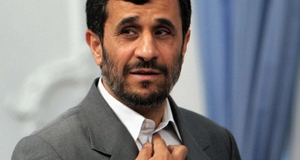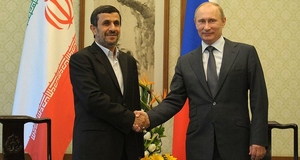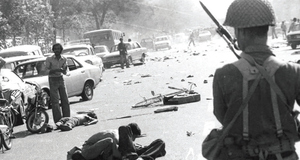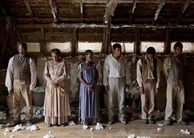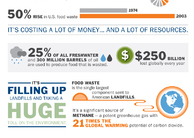Opinion:How to Think About Iran: Demystifying a Complex International Challenge
By
2010, Vol. 2 No. 06 | pg. 1/1
IN THIS ARTICLE
"When can we expect a pro-Western, pro-business government in Iran?" asks a US government official in the quasi-fictitious film Syriana. Today, it is highly probable that the same question is still being asked by anxious diplomats the world over. Iran’s nuclear aspirations, domestic repression and vast oil reserves have posed concern to both Western powers and its Arab neighbours. The resulting stigma which surrounds Irant—that of a backward nation run by basket-case ideologues—has perpetuated the string of diplomatic failures. Misinformation about Iran is rife and consequently, the West needs to go “back to school” on Iran. To not do so makes the Iranian situation unworkable, while one thing is clear: our strategy needs an overhaul. Complexity and Confusion: the Nature of the Iranian stateIran’s internal workings are as complex as any country in the international system. Contemporary Iran was born through the Islamic Revolution of 1979, which acted as the precursor for the formation of the Islamic Republic of Iran via a referendum. Following the flawed June 2009 presidential elections, Iran’s thinly-veiled democratic elements have been thrown out the window in favour of harsh repressive measures. Moreover, the true keepers of power in the Iranian state have revealed themselves, not as the fragmented clergy or President Ahmadinejad, but instead, the Revolutionary Guard. Formed as a vigilante organisation to cement Ayatollah Khomeini’s hold over Iran, the Revolutionary Guard later became integrated with the military following the advent of the Iran-Iraq War (1980-1988). In its present form, it is a multifaceted organisation owning roughly $12 billion in assets and possessing a majority stake in over a hundred companies. The Revolutionary Guard’s machinations have supplanted the Iranian state: President Ahmadinejad is a former Revolutionary Guardsman, as are a majority of the Iranian parliament and cabinet members. Following the June elections, the Revolutionary Guard and its plain-clothes sub-unit (baseej) have gained further influence, including powers of arrest. Of Rigged Elections and ProtestorsDue to the Revolutionary Guard’s tight grip on Iran’s political structure, the struggle for regime change in Iran is more challenging than most Western commentators acknowledge. The nationwide protest movement (known as the Green Movement) which emerged from the disputed outcome of the June 2009 elections, has rocked the regime, causing protests and disruption. However, the protest movement has yet to cause any changes in Iran’s political structure. This is not to say the Green Movement is failing, rather, with no independent intelligence emanating from Iran, it is difficult to gauge how effective the Movement’s exploits have been. As such, Western hopes for a swift toppling of the regime, echoing the implosion of the Soviet Union, may be unmatched by the reality of the situation. Nonetheless, the protests, which are still continuing and have grown in their vigour, serve as a constant reminder of the crisis of legitimacy the Iranian leadership faces.Black Gold, Silkworm Missiles, and an Unstable NeighbourhoodIran is a major player in global energy security. Today, 66 per cent of the world’s known oil reserves lie in the Middle East. By 2020, the proportion of the world’s oil in the region will have grown to 83 per cent. Iran is blessed with roughly 10 per cent of the world’s known oil reserves and produces around 2.7 million barrels per day. Moreover, Iran has control of a small island, Abu Masa, at the entrance to the Strait of Hormuz, where some 17 million barrels of oil, loaded on tankers, travel through each day. Abu Masa is equipped with Silkworm anti-ship missiles, easily capable of scuttling commercial tankers. As such, Iran has the potential to control almost 20 million barrels of oil per day, or 23 per cent of daily global demand. Iran, therefore, holds a salient stake in global energy markets. Rob Diamond, head of Securing America’s Future Energy (SAFE) notes that if Iran was to suspend its sovereign oil production of 2.7 million barrels, it ‘[could] result in tremendous national security and economic problems’ for the United States. Consider the calamity of stopping a further 17 million barrels from reaching global energy markets. Fully aware of these facts, Iran stares down Washington simply because it can afford to. The Nuclear QuestionIran’s nuclear ambitions have caused headaches for its neighbours and Western nations since the 1980s. With no existing commercial nuclear reactors in Iran, analysts’ best guesses are that Iran is seeking a nuclear weapon to act as a deterrent from either direct invasion by the United States or an Israeli bombing campaign. Although the intelligence on Iran’s nuclear program is not definitive, the International Atomic Energy Agency (IAEA) suspects that Iran has enriched uranium to 5 per cent, the most difficult step towards obtaining weapons-grade nuclear material. However, Iran’s nuclear program has run into technical obstacles, including a deficiency in uranium ore. These technical hiccups are, for the moment, keeping a nuclear-armed Iran at bay. Nightmare Scenario: a Nuclear Stalemate?Suppose that Iran acquires a nuclear weapon. Its nearest nuclear-armed neighbour is Israel, with between 100 to 200 warheads, the majority of which are located on submarines. Although negative stereotypes towards Iran permeate our media, the Iranian leadership is not foolish enough to launch a strike against Israel, a nuclear-armed nation with strong missile-defence capabilities. Iran would likely be obliterated in an Israeli second strike. Moreover, some 1.5 million Muslims live within Israel’s borders. Iran’s hatred of Israel runs deep, however, to assume that an Iranian nuclear weapon would be used as anything other than a deterrent is tantamount to claiming that the Iranian leadership is insane enough to commit two simultaneous genocides. It is more likely that the situation in the Middle East would resemble the state of affairs between India and Pakistan: a nuclear stalemate. Deft Moves, not a Strong ArmThe Iranian question has the potential to be solved without conflict or calamity. A former French ambassador to Iran, François Nicollaud, asserts that Iran will not ‘surrender’ if more pressure is applied. Instead, the regime is more likely to grit its teeth and strengthen its resolve to defy the West. It is for this reason that crippling economic sanctions or a pre-emptive military strike would be fruitless. Instead, the U.S. should explore innovative solutions which add to the obstacles Iran’s nuclear program currently faces. For instance, by ending the sale of uranium ore and high-strength steel to Iran, in addition to rigorous inspections of Iranian ships at foreign ports, the international community could exacerbates Iran’s current technical difficulties in a non-confrontational manner. Above all though, patience is wise. With a weak economy, high unemployment and double-digit inflation do more damage than Security Council initiatives. Chess in the Middle EastIran’s dubious intentions should certainly pose concern to leaders in the region, because a nuclear-armed Iran is not in the interest of regional security. Patience nevertheless remains paramount as we seek a non-confrontational resolution to the Iranian question. Suggested Reading from Inquiries Journal
Inquiries Journal provides undergraduate and graduate students around the world a platform for the wide dissemination of academic work over a range of core disciplines. Representing the work of students from hundreds of institutions around the globe, Inquiries Journal's large database of academic articles is completely free. Learn more | Blog | Submit Latest in Opinion |







